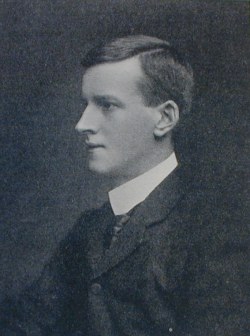 J.J. BELL
J.J. BELL J.J. BELL
J.J. BELL "J. J. B.," otherwise Mr. John Joy Bell, was born in
Glasgow in 1871, and is a son of Mr. James T. Bell, tobacco manufacturer. He was
educated at Glasgow University, and it was while still a student, in 1895, that,
like so many who have gone before him, he began his career of authorship with
the writing of verse. A year later he became editor of Glasgow University
Magazine. By way of natural progression, after leaving college, in 1898 he
joined the staff of The Scots Pictorial as assistant editor, and in that year
and the next he published two volumes of rhymes for children, "The New Noah's
Ark" and "Jack of All Trades." He also became a contributor of stories,
sketches, and verse to a number of the London magazines, and wrote regularly for
the columns of the Glasgow Evening Times, the Weekly Herald, and the People's
Friend. So successful was he with these efforts that he gave up his position on
the Scots Pictorial in order to secure more time for writing. A small collection
of his verse, inspired by the war in South Africa, then raging, was published
under the title of "Songs of the Hour" in 1900. Next in 1902 he astonished his
friends and delighted the public by a production of altogether different kind.
"Wee Macgreegor" was a series of sketches of ordinary working folk, the Robinson
family, such as might be met any Saturday night shopping in Trongate, but the
insight and kindly humour with which they were depicted were altogether
original, and the little book ran in a few months to between thirty and forty
editions. There is probably no English-speaking corner of the world to-day that
is not familiar with the name of "Wee Macgreegor." The sketches had originally
appeared in the columns of the Glasgow Evening Times, and they were followed by
further series which have since appeared in book form under the titles of
"Ethel," "Mistress McLeerie," "Wee Macgreegor Again," "Mr. Pennycook's Boy," and
"Christina." In a more serious vein is a novel of village life, "Jess & Co.,"
which, after running through the pages of the Woman at Home, was issued
separately in 1904. His later works are "Thou Fool," "Joseph Redhorn," and
"Whither Thou Goest," each successively reviewed by the press as his strongest
and most enduring production.
Three months before the phenomenal success of "Wee Macgreegor,"
Mr. Bell married, and in the pleasant seclusion of Blairmore, and more lately of
Craigendoran, he has settled down to regular literary work.
Back to
Index of Glasgow Men (1909)